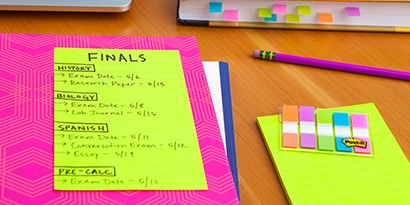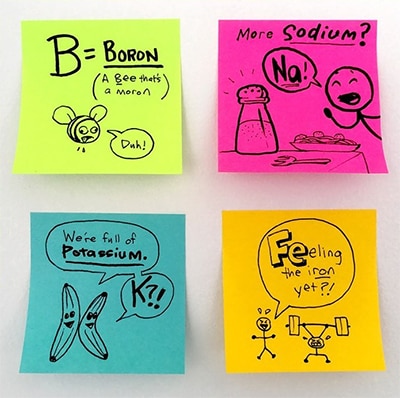
DON'T STRESS! Check out these 6 study tips to combat exam anxiety.
Studying for HSC and University exams can be, well, stressful. And stress is the last thing you need when you’re trying to cram info into your head for a test. We’ve got some tips that’ll sharpen your study skills and get you energised and motivated to achieve your best.
-
Doing a bit of planning for your study time is crucial! It’s the only way to make sure you get it all done, so you’ll learn more efficiently, rather than getting caught up in the stress of feeling disorganised and rushed. And when you get it done, you’ll be energised for what’s next. With these tips and a few Post-it® Products, you can improve your study habits, which will make prepping for exams your new favourite thing! OK, maybe that’s a stretch — but it’ll be way less painful.
-
1. Study early and often
If you're looking up an article on study methods, it might be too late for this, but we're throwing it out there anyway. If you can, start reviewing your notes and textbooks at least a week before finals. The more time you give the info to sink in, the more of it will stick.
-
2. Stay organised

So, organisation is kind of our thing, we admit, but we make Post-it® Products for a reason. They help you keep track of priorities and to-dos, ideas you've had (like writing down essay ideas at the end of a chapter without tearing the page), mark important passages to come back to (like when you use Post-it® Flags to mark pages by colour so you can easily see them when you come back) or help you take notes along the way without writing in your textbook (like when you use Post-it® Page Markers and add notes directly to a page). But you know what? Organise however works best for you — just ORGANISE!
-
3. Go to sleep
Seriously, staying up all night is not going to help you study better. You might feel like you're getting a lot done, but you're probably sapping your mental strength, not to mention getting cranky and annoying your friends. Close the books, turn off your phone and get some rest.
-
4. Find some help

One effective way to study is to divide and conquer subjects amongst friends. Break your subject into manageable topics, assign yourself and friends one topic each, spend some time understanding that topic and writing notes, then regroup at the end of that session and share the learnings of each topic. Other people's ideas, perspectives and even note-taking skills can help you test just how sharp your knowledge really is.
-
5. Make a schedule

Check your Board of Studies and University exam timetables to know which exams are coming up when and how much time you've got to study for each one. Create a study schedule and cross off each subject as you complete it, so you can focus on what's most urgent and make sure no deadlines pass you by.
-
6. Draw a mental picture

For that one tough fact, number or date you just can't remember, try assigning a mental picture to it — the weirder, the better. It doesn't have to have anything to do with the fact, but it can work surprisingly well to help you recall something later. So, if bees and bananas help you remember the Periodic Table, then bees and bananas are your new best friend. Draw your mental pictures on Post-it® Super Sticky Notes and stick them wherever you’ll see them frequently, like your notebook or planner. You can stick and re-stick them almost anywhere, which will make sure that your drawings — however random they might seem — help you retain the pesky stuff that always seems to slip your mind.
Look, we get it — studying is hard and procrastination can creep up, but try these tips along with the right tools to make a tough process smoother. When you’re less stressed and more motivated, getting things done is super energising — you’ll learn more efficiently, and ace those exams like it’s your job (because, well, it is). And when you do your job well, you’re ready to make your mark on the world. Follow these tips and thanks us later!
1. Study early and often
2. Stay organised
3. Go to sleep (seriously)
4. Find some help
5. Make a schedule
6. Draw a mental picture

